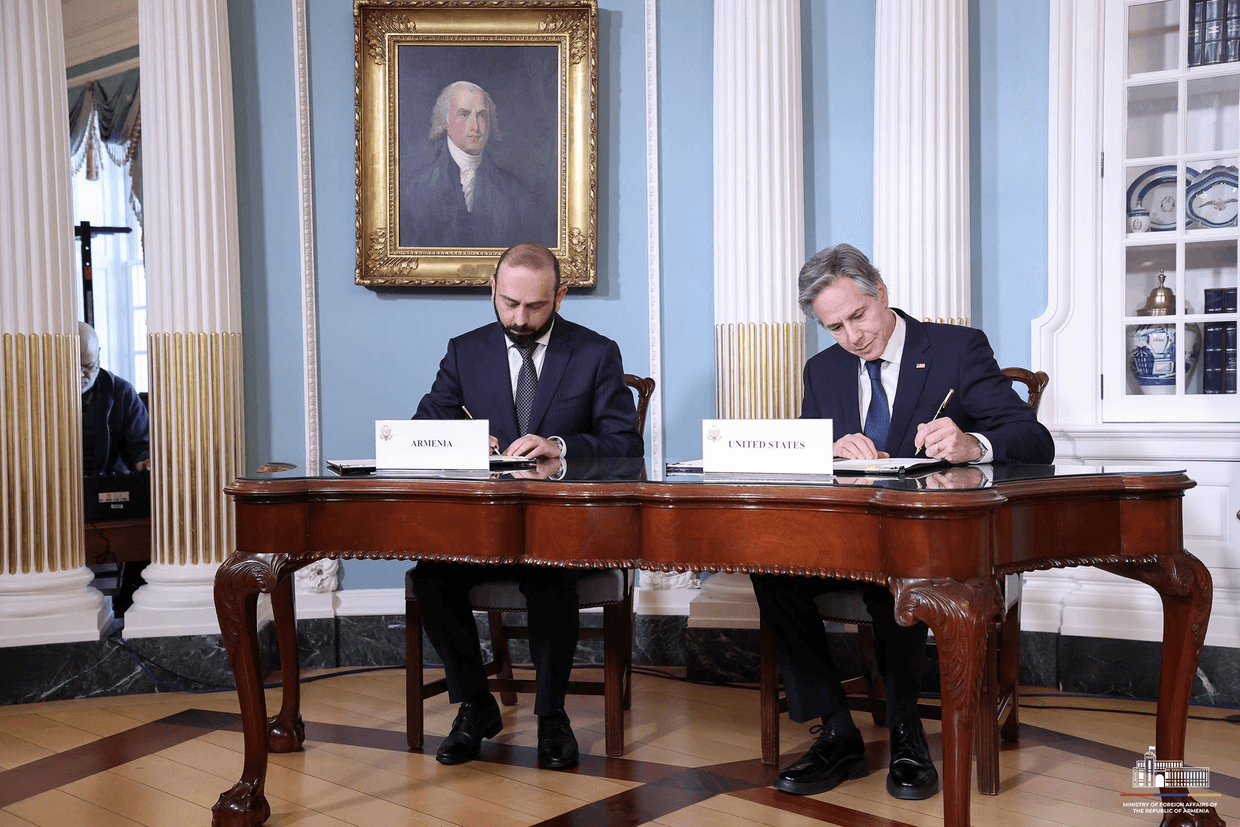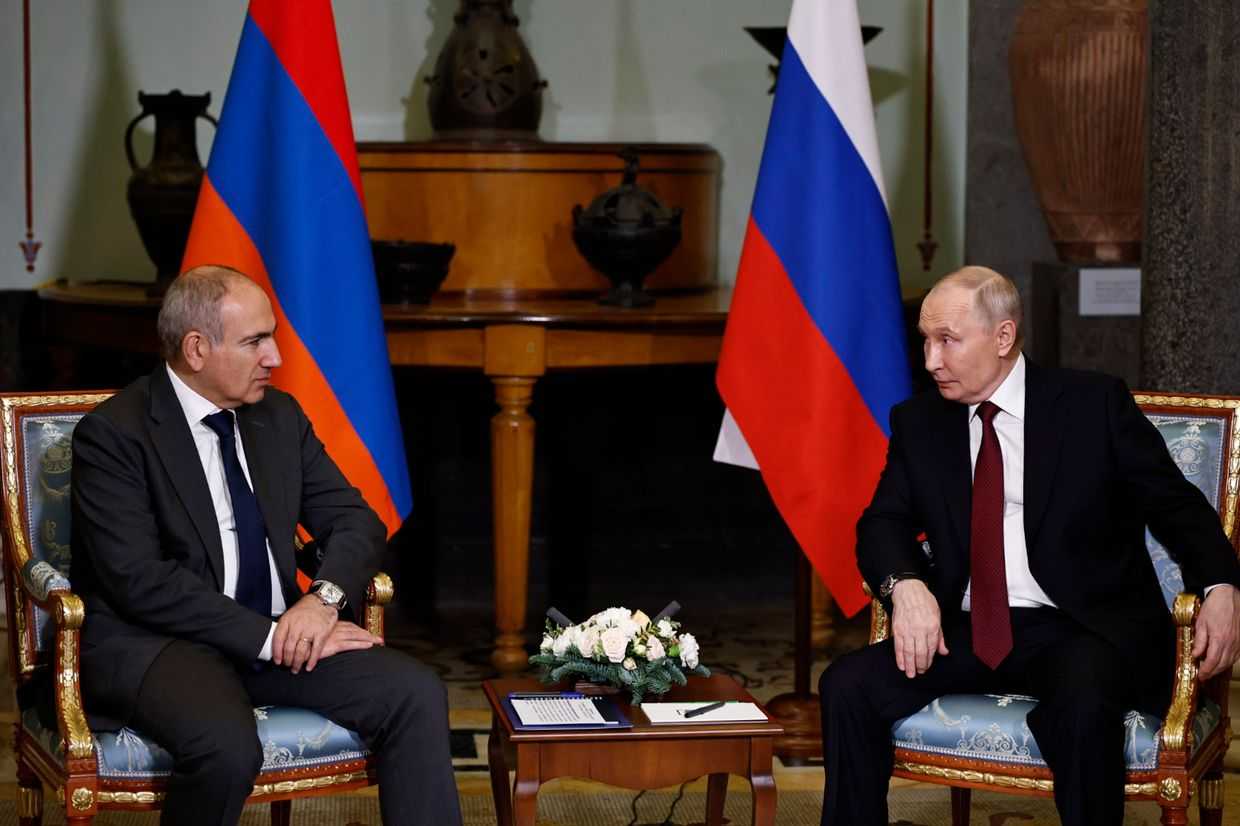
On Tuesday, Armenia and the US signed a Strategic Partnership Charter in Washington, DC.
The document was signed by Armenian Foreign Minister Ararat Mirzoyan and the US Secretary of State Antony Blinken, and stresses a mutual desire to strengthen relations across the diplomatic, economic, energy, high-tech, educational, scientific, cultural, legal, defence, and security fields.
Mirzoyan stated that US-Armenia bilateral relations witnessed ‘remarkable growth in recent years’ and ‘matured to a point where upgrading them to a strategic partnership is not only fitting but essential for navigating the complex geopolitical landscape’.
He added that they commenced negotiations on a nuclear cooperation agreement with the US, as well as Armenia’s intention to join the Global Coalition to defeat the Islamic State.
Mirzoyan also expressed Armenia’s eagerness to continue working with the incoming administration of President-elect Donald Trump in order ‘to fulfil the ambitious goals outlined in our Strategic Partnership Charter’.
Blinken called the signing of the agreement ‘a significant milestone’ in US–Armenia bilateral relations and said it ‘lays the foundation for even deeper cooperation’. According to Blinken, it would ‘contribute to a more resilient, a more peaceful, a more secure, a more independent South Caucasus’.
He also announced that ‘in the coming weeks’, a US Customs and Border Patrol team would travel to Armenia, to work with their Armenian counterparts ‘on border security capacity building, strengthening security cooperation, enhancing Armenia’s peacekeeping capabilities through exercises like Eagle Partner’.
Eagle Partner is a military peacekeeping drill held in Armenia alongside the US in 2023 and 2024.
The announcement came as Russian border guards were withdrawn in 2024 from several locations in Armenia amid Yerevan’s deteriorating relations with the Kremlin.
Firstly, Russian troops were removed from several regions bordering Azerbaijan and its exclave Nakhchivan, where they were stationed in the aftermath of the Second Nagorno-Karabakh War. Following this, Russian border guards were also withdrawn from Yerevan’s Zvartnots airport, then the Agarak checkpoint on the border with Iran, where they had been stationed since Armenia’s independence in 1991.
A day before the Russian border guards’ departure from Yerevan’s airport, US Assistant Secretary of State James O’Brien commented on Russia’s relations with Armenia and the presence of its border guards at Zvartnots, noting that ‘much of the population of Armenia wants to get further from Russia, so we’re creating the conditions for that to happen’.
Russia claims Armenia will be ‘asked’ to join Western sanctions
Russian officials and others affiliated with Russo-centric regional organisations did not react to the signing of the charter favourably.
Russian Foreign Minister Sergey Lavrov, Kremlin spokesperson Dmitry Peskov, and the Secretary General of the Collective Security Treaty Organisation (CSTO) Imangali Tasmagambetov, a Kazakh national, stated that the development of a strategic partnership with the US was Armenia’s sovereign right, but criticised the decision nonetheless.
Peskov claimed that the US ‘has never played a particularly stabilising role in the South Caucasus, one could even say the opposite’, while Lavrov suggested that Armenia would be ‘asked’ to join Western sanctions.
Lavrov also said that bilateral relations between Armenia and Russia are ‘not without difficulties’, but said that ‘dialogue continues’ and added that his counterpart Mirzoyan accepted the invitation to visit Russia and they look forward to ‘having him here soon’.
In response, the Armenian Foreign Ministry spokesperson announced that Mirzoyan’s visit to Moscow ‘was planned more than two months ago’.
On Wednesday, Armenian and Russian relations marked another crisis when the Armenian Foreign Ministry announced that Russia’s Ambassador to Armenia was summoned and handed a letter of protest concerning a programme aired on Russia’s state TV, in which statements were made against Armenia’s sovereignty and territorial integrity.
High-Tech Industries Minister Mkhitar Hayrapetyan then suggested that the programme could be banned in Armenia.
On the same day, Russian Deputy Prime Minister Alexei Overchuk said that they consider Yerevan’s decision to back a draft law announcing the beginning of the process of joining the EU to be ‘the beginning of Armenia's withdrawal from the EAEU [Eurasian Economic Union]’.
According to Overchuk, they already observed last year that ‘under the influence of discussions about joining the EU, Russian business began to be more cautious about further maintaining and developing economic ties with Armenia’.











